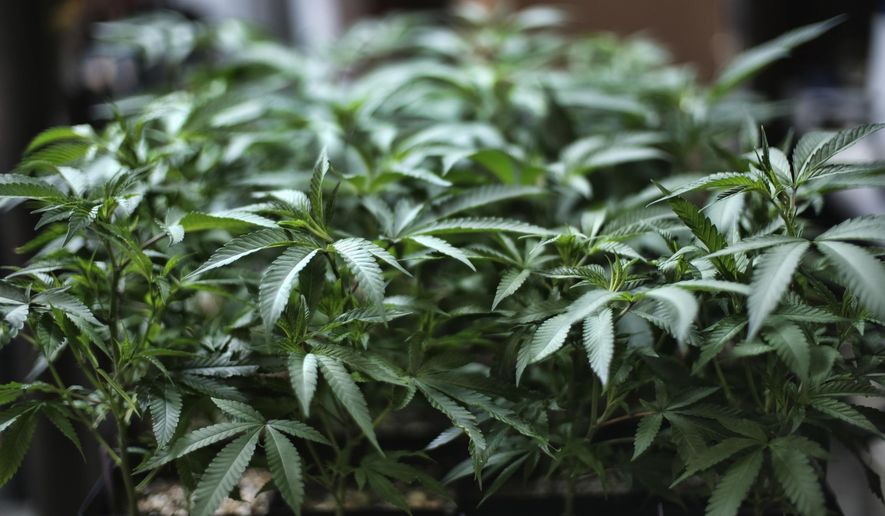House Democrats celebrated passing a historic marijuana-legalization bill, but the timing, with coronavirus relief still on hold, still irked a handful of the party’s more moderate members.
The bill passed with a solid 228-164 vote Friday, almost entirely on party lines with five Republicans joining the majority and six Democrats voting no.
Among the Democratic defectors, Rep. Conor Lamb of Pennsylvania strongly condemned the vote, arguing that the bill should not have been a priority.
“Decriminalizing marijuana is an important issue that should be taken seriously & done the right way. This isn’t the right way,” he tweeted. “Right now, an American is dying every minute, people are going broke, & nursing homes are still too vulnerable. We should be focused on nothing else.”
He was the only Democrat who voted against the bill to make a public statement.
The other Democrats who broke with the party on marijuana legalization were Reps. Cheri Bustos and Dan Lipinski of Illinois, Henry Cuellar of Texas, Chris Pappas of New Hampshire and Collin Peterson of Minnesota.
A $908 billion bipartisan coronavirus stimulus package is in the works and lawmakers are optimistic they will finally pass another round of relief. But a deal is still far from complete with time running out before the holiday break.
Leadership on both sides of the Capitol is negotiating not only a stimulus package but also a massive government spending bill needed to avoid a federal shutdown on Dec. 11.
For weeks, Republicans hammered Democrats for choosing to pass marijuana legislation before putting popular coronavirus relief proposals to a vote.
“Working is something that this majority has not a good record on. Just look at the floor schedule this week, Democrats have focused on cats and cannabis,” House Minority Leader Kevin McCarthy said, referring to another bill passed this week that banned ownership of big cats.
“You think after a humiliating defeat at the ballot box … that Democrats will get the picture — that Americans are demanding some action on these issues,” he said.
House Democrats took a beating in the election with Republicans gaining at least 10 seats, leaving Democrats with the smallest House majority in decades.
Rep. Dean Phillips, a member of the bipartisan Problem Solvers Caucus that’s working on the compromise proposal, said he supported the marijuana legalization bill but admitted the timing looked bad.
“Yes, optics do matter and I recognize why some people might be troubled by that. That’s why we’re working hard to get this [bipartisan deal] done,” the Minnesota Democrat told The Washington Times. “Let me put it this way, if we failed to pass an emergency COVID relief bill by the time we leave here at the end of this year, then yes, I will be disappointed. But let’s give it time and see what happens.”
The marijuana vote — which was first on a legalization bill on either side of the Capitol — was delayed earlier this year because rank-and-file members from vulnerable districts were concerned about passing it before coronavirus relief just weeks before the Nov. 3 election.
Despite expectations that the bill will go nowhere in the GOP-controlled Senate, it remained a top priority for Democrats who said it would help address entrenched racial justice disparities.
“Millions of Americans’ lives have been upended as a result of convictions for possessing small amounts of marijuana, and the racial disparities in conviction rates for those offenses are as shocking as they are unjust,” said House Majority Leader Steny H. Hoyer, Maryland Democrat.
The bill would remove marijuana from the federal list of controlled substances and expunge some related criminal records. States would still be allowed to determine their own laws on selling marijuana.
It would also create a 5% sales tax on marijuana products, which would fund programs job training, legal aid, substance abuse treatment, and small business loans for “individuals most adversely impacted by the War on Drugs.”
Mr. McCarthy’s criticism of the timing continued the GOP’s election-year attacks on Democrats for embracing socialism and far-left policies such as the defund-the-police movement.
The attacks appeared to work in the election as much of the Democrats’ gains from the 2018 midterms slipped away this year.
That’s how many frontline House Democrats said when they hashed out their frustrations with party leaders in a post-election conference call.
When asked about comparing Democratic leaders’ strategy on the marijuana bill to how they handled the election, Rep. Elissa Slotkin, who won reelection in a battleground district, said Republicans should worry more about keeping their members in line.
“I think it’s a little disingenuous for the same people to be pointing a finger who haven’t been able to get a unified position from their own party,” the Michigan Democrat told The Times. “Everybody’s got some blame that they’ve got to own in this, and the White House and the Senate are two legs of the stool.”
“I mean, of course, I would much prefer that the first order of business we did when we were back after Thanksgiving was COVID,” she said. “But I do you understand that we have to keep doing other businesses. And so while I’d much prefer COVID to go first, I understand that the world has to go on.”
• Gabriella Muñoz can be reached at gmunoz@washingtontimes.com.




Please read our comment policy before commenting.